| Srl | Item |
| 1 |
ID:
073630


|
|
|
| 2 |
ID:
184873
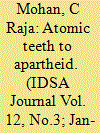

|
|
|
| 3 |
ID:
142789
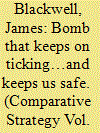

|
|
|
|
|
| Summary/Abstract |
The United States Air Force has returned from its nuclear modernization and intellectual holidays. The B61 Life Extension Program and nuclear capability for the F-35 fighter are at the leading edge of a flight plan that vectors the institution to rebuild the nation's extended deterrent; its two legs of our strategic triad; and nearly all nuclear command, control, and communications infrastructure, to deter emerging nuclear threats and assure allies new and old. This flight plan is framed by new efforts across the cognitive domain of war so that all airmen understand how vastly different twenty-first century deterrence is from the Cold War.
|
|
|
|
|
|
|
|
|
|
|
|
|
|
|
|
| 4 |
ID:
114851
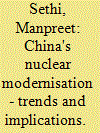

|
|
|
| 5 |
ID:
099473
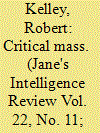

|
|
|
| 6 |
ID:
114706


|
|
|
|
|
| Publication |
2012.
|
| Summary/Abstract |
As Iran continues its pursuit of a nuclear capability, outside observers have debated just how worried the world should be. Optimists argue that since nuclear war would be suicidal, no government would ever risk it, and they think the Islamic Republic would be no exception. Pessimists argue that Iran's radical and unstable regime might behave in unpredictable ways and cannot be trusted. Both camps seem to agree that rationality is the key to deterrence; they disagree over whether a nuclear Iran would be rational.
|
|
|
|
|
|
|
|
|
|
|
|
|
|
|
|
| 7 |
ID:
139653
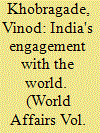

|
|
|
|
|
| Summary/Abstract |
Vinod Khobragade discusses India’s contemporary prime foreign policy interests. While keeping its democratic setup alive, India has shed traditional foreign policy objectives and made new choices reflecting the changing patterns of international politics. The aim is to boost holistic development and make the country one of the leading though benign powers of the world.
|
|
|
|
|
|
|
|
|
|
|
|
|
|
|
|
| 8 |
ID:
052536


|
|
|
|
|
| Publication |
Apr-Jun 2004.
|
|
|
|
|
|
|
|
|
|
|
|
|
|
|
|
| 9 |
ID:
133523
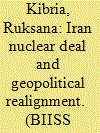

|
|
|
|
|
| Publication |
2014.
|
| Summary/Abstract |
The November 2013 interim nuclear deal that was signed between the P5+1 and Iran is an epochal event, though, given the volatile situation, it may be too early to make a correct prognosis of its ramifications. For one thing, the nuclear deal could complicate the regional security environment by exacerbating Saudi-Iranian tension, though as such, it is not the source. Regardless of Saudi displeasure at the conclusion of the accord, Iran's ascendancy is amply clear, with its ambiguous nuclear status playing a strategic role. While the dominant narrative currently is the centrality of Shia-Sunni regional tension represented by Iran and Saudi Arabia, reality is far more intricate and multi-dimensional, requiring a more nuanced appreciation of their relationship, which suggests that, for the foreseeable future it would be in the US interest to have Saudi Arabia, off-setting Iran, but from a much weaker position, in a replay of the game of balance of power achieved through sustained geopolitical manipulation, and a smaller American foot-print. The goal of Tehran's nuclear brinksmanship is essentially ensuring its regional primacy, which accords with US interests, too. While the recent interim Iran deal apparently concerns the nuclear issue, it has far-reaching implications for the global energy market, which the relaxation of economic sanctions and the integration of Iran as a legitimate member of the international community is certain to affect. US-Iran normalisation of relations is quietly enhancing China's role, both economic and military, in the Gulf region, whose energy resources for the foreseeable future would continue to remain crucial for Beijing. More than a reconciliation between Washington and Tehran, the essence of a real paradigm shift would involve a Saudi-Iranian accommodation, and de facto Saudi acceptance of Iran's regional pre-eminence.
|
|
|
|
|
|
|
|
|
|
|
|
|
|
|
|
| 10 |
ID:
109829


|
|
|
| 11 |
ID:
192646
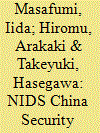

|
|
|
|
|
| Publication |
Tokyo, NIDS, 2023.
|
| Description |
77p.pbk
|
| Standard Number |
9784864821230
|
|
|
|
|
|
|
|
|
|
|
|
Copies: C:1/I:0,R:0,Q:0
Circulation
| Accession# | Call# | Current Location | Status | Policy | Location |
| 060459 | 355.033051/MAS 060459 | Main | On Shelf | General | |
|
|
|
|
| 12 |
ID:
075878


|
|
|
| 13 |
ID:
100182


|
|
|
|
|
| Publication |
2010.
|
| Summary/Abstract |
ONE OF THE THORNIEST ISSUES in today's international situation is the creation in North Korea, or the Democratic People's Republic of Korea (DPRK), of nuclear weapons. The world community believes it undermines international stability and security and urges that the DPRK scrap its nuclear program. As for Pyongyang, it insists on its sovereign right to have this deterrent. The farther the North goes along this road, the stronger is the pressure upon it and the worse the situation surrounding this state. As a result, there is a danger that the process may not only spin out of control but also spark a serious conflict on the Korean Peninsula.
|
|
|
|
|
|
|
|
|
|
|
|
|
|
|
|
| 14 |
ID:
063473


|
|
|
| 15 |
ID:
109055
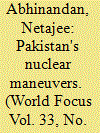

|
|
|
| 16 |
ID:
176975


|
|
|
| 17 |
ID:
174617


|
|
|
|
|
| Summary/Abstract |
Pakistan and India have been arch-enemies since their independence from the British Rule. There have been over four full-fledged armed conflicts, countless border skirmishes and cross-border ceasefire violations between these neighbouring countries. Their mutual relationships have often nosedived to a point where the nuclear conflagration seemed real possibility. While India is among the five largest military spenders in the world, Pakistan spends a disproportionately larger share of its GDP on defence to neutralize the Indian military advantage. While Pakistan's military expenditure is largely India-specific, it is not clear if the reverse is also true. Therefore, this study explores if the military expenditure of India and Pakistan are causally associated with each other or the arms race is asymmetric. Using the maximum entropy bootstrapping method and a series of robustness checks, we find that while military expenditure of Pakistan is shaped by the Indian military expenditure, the military expenditure in India is not Pakistan-specific. This study has important policy implications for the region because Pakistan may explore alternative strategic relationships with India. A revision of strategic relationship between the two South Asian neighbours may help in the resolution of the long-standing political, social and economic problems of both the countries.
|
|
|
|
|
|
|
|
|
|
|
|
|
|
|
|
| 18 |
ID:
111289


|
|
|
|
|
| Publication |
2012.
|
| Summary/Abstract |
The latest report of the International Atomic Energy Agency (IAEA) on Iran's alleged nuclear weapons programme, released on November 8, 2011, has effectively raised the global threat level. The agency faced the daunting challenge of making a judgement on how far Iran's nuclear programme has advanced and its potential for weaponisation on the basis of suggestive but dated, inconclusive and possibly fake evidence (hundreds of pages of evidence have been sourced to one laptop of unproven provenance given to the IAEA by a Western intelligence agency).
|
|
|
|
|
|
|
|
|
|
|
|
|
|
|
|
| 19 |
ID:
099092
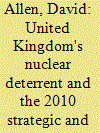

|
|
|
| 20 |
ID:
119253


|
|
|
|
|
| Publication |
2013.
|
| Summary/Abstract |
Nuclear weapons remain deeply embedded not only in strategic thinking and force postures, but also in our political cultures in ways that assign multiple, powerful socio-political values to the bomb. Progress towards nuclear zero will necessarily require peeling away the layers of value to the point where it becomes politically, strategically, and socially acceptable to permanently relinquish a nuclear capability. The concept and process of devaluing nuclear weapons is contested. It is a broad concept that covers notions of reducing the role, delegitimizing, reducing the salience, and marginalizing nuclear weapons in the declaratory and operational policies of the nuclear powers. This article argues that to understand what a process of devaluing might look like, we first need a deeper understanding of how nuclear weapons are valued. To achieve this, the article moves through four stages. First, it provides an overview of the lexicon of devaluing and subsidiary terms in global nuclear discourse since the end of the Cold War. Second, it discusses how we know nuclear value and its discursive construction. Third, using the United Kingdom as a case study it explores the 'regime of value' in which British nuclear weapons are embedded and the implications for devaluing. Finally, it reflects on William Walker's notion of 'responsible nuclear sovereignty' and the tensions at the nexus of deterrence/devaluing.
|
|
|
|
|
|
|
|
|
|
|
|
|
|
|
|